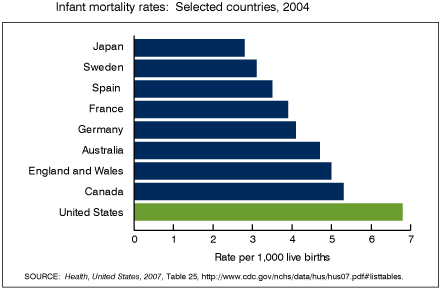Both presidential candidates have promised to make significant changes to health care policy in the United States. An issue that warrants their attention is infant mortality, a key indicator of the well-being and effectiveness of a country’s health care system.
Infant mortality in the United States declined by 2 percent in 2006 according to a report issued by the Centers for Disease Control and Prevention this week. However, the United States has a higher infant mortality rate than most developed countries, and the gap appears to be widening. The U.S. rank has been steadily worsening: in 1960, the U.S. was ranked 12th in the world; by 2004, the U.S. fell to 29th, tied with Poland and Slovakia, and worse than Japan, Cuba, and most of the European Union (2004 is the most recent international comparative data published by the CDC). The infant mortality rate in the US currently stands at 6.86 infant deaths per 1,000.

The report also shows that the infant mortality rate for black women was 2.4 times that of white women. Rates were also elevated for Puerto Rican and Native American women.
The CDC report calls infant mortality “one of the most important indicators of the health of a nation, as it is associated with a variety of factors such as maternal health, quality and access to medical care, socioeconomic conditions, and public health practices.”
A separate report published by the Commission to Build a Healthier America earlier this month found that there is a high correlation between infant mortality and the education level of the mother. Infant mortality is 40 percent higher among mothers with 13 to 15 years of schooling, compared with mothers with at least 16 years of school (i.e. a college degree).
The report also ranked the states based on the disparity in infant mortality rates between those mothers with college degrees and those without. Tennessee and the District of Columbia had the highest discrepancy in infant mortality rates between college and non-college educated mothers.
The fact-finding report did not examine the underlying causes for these geographic and racial discrepancies, but the commission will issue a set of recommendations in the spring, which will focus on a holistic approach to health care.
“Maternal and child health is the cornerstone of health in general,” said Sue Egerter, one of the authors of the report.
